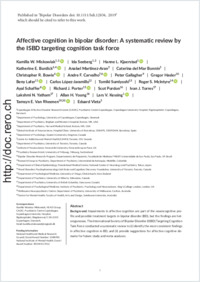Affective cognition in bipolar disorder: A systematic review by the ISBD targeting cognition task force
- Miskowiak, Kamilla W. Copenhagen Affective Disorder Research Centre (CADIC), Psychiatric Centre Copenhagen, Copenhagen University Hospital, Rigshospitalet, Copenhagen, Denmark - Department of Psychology, University of Copenhagen, Copenhagen, Denmark
- Seeberg, Ida Copenhagen Affective Disorder Research Centre (CADIC), Psychiatric Centre Copenhagen, Copenhagen University Hospital, Rigshospitalet, Copenhagen, Denmark - Department of Psychology, University of Copenhagen, Copenhagen, Denmark
- Kjaerstad, Hanne L. Copenhagen Affective Disorder Research Centre (CADIC), Psychiatric Centre Copenhagen, Copenhagen University Hospital, Rigshospitalet, Copenhagen, Denmark
- Burdick, Katherine E. Department of Psychiatry, Brigham and Women’s Hospital, Boston, MA, USA - Department of Psychiatry, Harvard Medical School, Boston, MA, USA
- Martinez‐Aran, Anabel Clinical Institute of Neuroscience, Hospital Clinic, University of Barcelona, IDIBAPS, CIBERSAM, Barcelona, Spain
- Bonnin, Caterina del Mar Clinical Institute of Neuroscience, Hospital Clinic, University of Barcelona, IDIBAPS, CIBERSAM, Barcelona, Spain
- Bowie, Christopher R. Department of Psychology, Queen’s University, Kingston, Canada
- Carvalho, Andre F. Centre for Addiction and Mental Health (CAMH), Toronto, ON, Canada - Department of Psychiatry, University of Toronto, Toronto, Canada
- Gallagher, Peter Institute of Neuroscience, Newcastle University, Newcastle‐upon‐Tyne, UK
- Hasler, Gregor Psychiatry Research Unit, University of Fribourg, Fribourg, Switzerland
- Lafer, Beny Bipolar Disorder Research Program, Departamento de Psiquiatria, Faculdade de Medicina FMUSP, Universidade de Sao Paulo, Sao Paulo, SP, Brazil
- López‐Jaramillo, Carlos Research Group in Psychiatry, Department of Psychiatry, Universidad de Antioquia, Medellín, Colombia
- Sumiyoshi, Tomiki Department of Clinical Epidemiology, Translational Medical Center, National Center of Neurology and Psychiatry, Tokyo, Japan
- McIntyre, Roger S. Mood Disorders Psychopharmacology Unit Brain and Cognition Discovery Foundation, University of Toronto, Toronto, Canada
- Schaffer, Ayal Department of Psychiatry, University of Toronto, Toronto, Canada
- Porter, Richard J. Department of Psychological Medicine, University of Otago, Christchurch, New Zealand
- Purdon, Scot Department of Psychiatry, University of Alberta, Edmonton, Canada
- Torres, Ivan J. Department of Psychiatry, University of British Columbia, Vancouver, Canada
- Yatham, Lakshmi N. Department of Psychiatry, University of British Columbia, Vancouver, Canada
- Young, Allan H. Department of Psychological Medicine, Institute of Psychiatry, Psychology and Neuroscience, King’s College London, London, UK
- Kessing, Lars V. Copenhagen Affective Disorder Research Centre (CADIC), Psychiatric Centre Copenhagen, Copenhagen University Hospital, Rigshospitalet, Copenhagen, Denmark
- Rheenen, Tamsyn E. Van Melbourne Neuropsychiatry Centre, Department of Psychiatry, University of Melbourne, Carlton, Australia - Centre for Mental Health, Faculty of Health, Arts and Design, Swinburne University, Australia
- Vieta, Eduard Clinical Institute of Neuroscience, Hospital Clinic, University of Barcelona, IDIBAPS, CIBERSAM, Barcelona, Spain
-
2019
Published in:
- Bipolar Disorders. - 2019, vol. 21, no. 8, p. 686-719
English
Background: Impairments in affective cognition are part of the neurocognitive profile and possible treatment targets in bipolar disorder (BD), but the findings are heterogeneous. The International Society of Bipolar Disorder (ISBD) Targeting Cognition Task Force conducted a systematic review to (i) identify the most consistent findings in affective cognition in BD, and (ii) provide suggestions for affective cognitive domains for future study and meta‐analyses.Methods: The review included original studies reporting behavioral measures of affective cognition in BD patients vs controls following the procedures of the Preferred Reporting Items for Systematic reviews and Meta‐Analysis (PRISMA) statement. Searches were conducted on PubMed/MEDLINE, EMBASE, and PsychInfo from inception until November 2018.Results: A total of 106 articles were included (of which nine included data for several affective domains); 41 studies assessed emotional face processing; 23 studies investigated reactivity to emotional words and images; 3 investigated explicit emotion regulation; 17 assessed implicit emotion regulation; 31 assessed reward processing and affective decision making. In general, findings were inconsistent. The most consistent findings were trait‐related difficulties in facial emotion recognition and implicit emotion regulation, and impairments in reward processing and affective decision making during mood episodes. Studies using eye‐tracking and facial emotion analysis revealed subtle trait‐related abnormalities in emotional reactivity.Conclusion: The ISBD Task Force recommends facial expression recognition, implicit emotion regulation, and reward processing as domains for future research and meta‐analyses. An important step to aid comparability between studies in the field would be to reach consensus on an affective cognition test battery for BD.
- Faculty
- Faculté des sciences et de médecine
- Department
- Master en médecine
- Language
-
- English
- Classification
- Biological sciences
- License
-
License undefined
- Identifiers
-
- RERO DOC 327432
- DOI 10.1111/bdi.12834
- Persistent URL
- https://folia.unifr.ch/unifr/documents/308228
Statistics
Document views: 160
File downloads:
- pdf: 360
